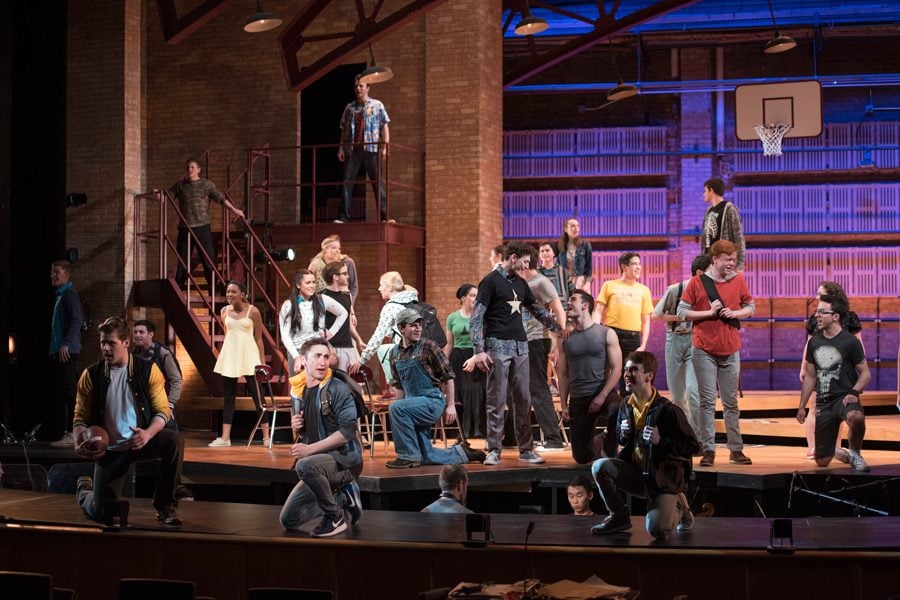Waa-Mu to feature performance with open captioning in effort to increase accessibility
Daily file photo by Alex Castro
Students perform at the 86th Waa-Mu show, “Beyond Belief: A Superhero Story.” Waa-Mu will hold a performance of the 87th Waa-Mu show with open captioning.
April 10, 2018
As part of an effort to expand accessibility to audiences who are deaf or hard of hearing, one performance of the 87th annual Waa-Mu Show, “Manhattan Miracle,” will for the first time feature open captioning and display all the words and sounds of the show on a screen above the stage.
The decision to add captions was made by Communication seniors Andrew Restieri and Sarah Ohlson, two of the four co-chairs for Waa-Mu — the largest student-written and produced musical in the country. Restieri and Ohlson said it can be very beneficial to those who are deaf or hard of hearing.
“We were looking for a really targeted, specific way and tangible way to make our show more accessible,” Restieri said.
Last year’s Waa-Mu Show was interpreted in American Sign Language, Restieri said. However, he said not everyone who is hard of hearing is fluent in ASL, making it a limiting form of translation.
“We wanted to find a way that was even more accessible to even more communities,” Ohlson said. “We’re hoping to pave the way for future Wirtz productions and future Waa-Mu (productions) to have captioning.”
Restieri, Ohlson and the rest of the Waa-Mu team said they are marketing the performance specifically to deaf and hard of hearing audiences in the Chicago area. Older patrons, some of whom have been attending Waa-Mu performances for decades, can also have trouble hearing the dialogue in shows, Restieri said. Ohlson and Restieri said they hope captions displayed above the stage will solve that problem.
Waa-Mu’s community relations co-directors, Communication junior Ziare Paul-Emile and Communication senior Vanessa Strahan, said they reached out to the Chicago Cultural Accessibility Consortium, a nonprofit organization with the mission of making Chicago cultural spaces more accessible to those with disabilities, for help in acquiring equipment.
CCAC partners with the Steppenwolf Theatre Company to loan equipment to Chicago-area organizations that are looking to perform more accessible shows.
However, Strahan and the Waa-Mu executive board decided to use the screen already available in Cahn Auditorium to ensure all audience members will be able to see it. Because seats are priced differently based on location, Strahan said Waa-Mu wanted to make sure the captions are visible from everywhere in the auditorium.
Strahan said Waa-Mu didn’t want price to affect whether audience members could see the screen, adding that the CCAC is still involved in training members of Waa-Mu to use the equipment it already has.
“The last thing we want to do is shut people away because we are not able to provide for them,” Paul-Emile said. “For us, it takes that extra step to be sure that things are accessible to them. Not every performance does that.”
An increase in accessibility is only one part of Waa-Mu’s attempt to be more inclusive, Paul-Emile said. The organization’s community relations department was created to increase diversity in every aspect of Waa-Mu productions, from the writing room to the stage, Paul-Emile said.
“Access to art is a universal human right, and (this is) a really simple step for us to take,” Strahan said.
“Manhattan Miracle” opens May 4 in Cahn Auditorium, and the captioned production will take place May 12.
Email: cameroncook2021@u.northwestern.edu
Twitter: @cam_e_cook


